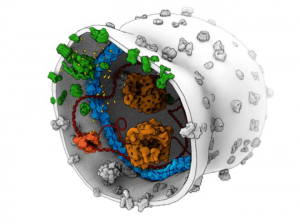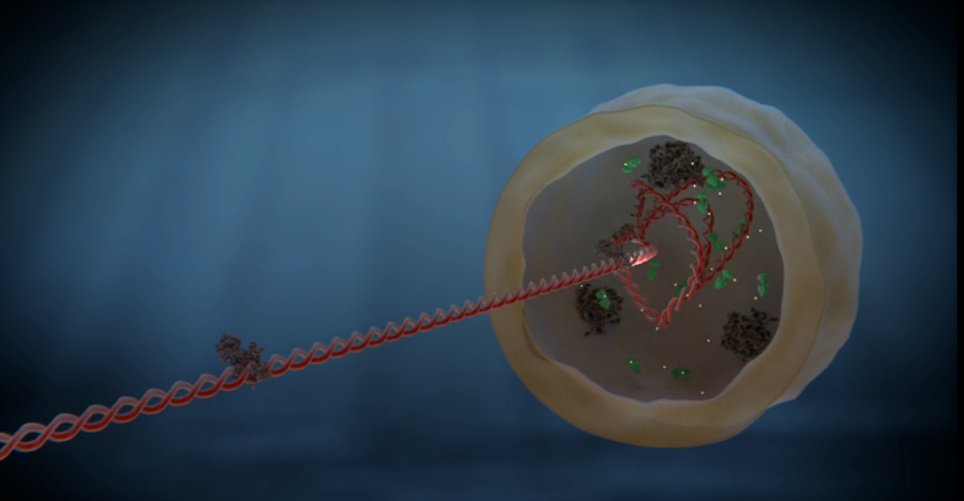Dutch researchers join forces to build synthetic cell

The Dutch research consortium BaSyC is taking on the challenge of building a synthetic biological cell. For part of its funding, it has received a grant worth almost € 19 million from the Gravitation programme of the Netherlands Organisation for Scientific Research (NWO). The research partners will themselves be funding the remaining six million of the total of over € 25 million that the research programme will cost. AMOLF, together with five universities, is taking part in the consortium that is led by TU Delft. ‘A fundamental understanding of life within a cell will bring huge intellectual, scientific and technological rewards.’
Life
Constructing a synthetic biological cell is one of science’s greatest challenges of the 21st century. We already have extensive knowledge of the molecular building blocks that form the basis of life, but we do not yet understand how they work together to make life possible.
The cell is the basis of all organisms. ‘The BaSyC consortium therefore aims to combine biomolecular building blocks to construct an autonomous, self-reproducing cell: a cell that can maintain its own integrity, grow and reproduce’, says coordinating scientist Prof. Marileen Dogterom, head of TU Delft’s BioNanoscience department.
Bottom up
‘We intend to build this synthetic cell from the bottom up, the most fundamental strategy for learning to understand a cell’, continues Dogterom. ‘A fundamental understanding of life within a cell will bring huge intellectual, scientific and technological rewards. It will also simultaneously raise philosophical and ethical questions about how society should deal with this new understanding and potential.’
‘We plan to derive the molecular building blocks and mechanisms from various existing rudimentary organisms. This means that the end product will function based on the principles of life as we know it, without mimicking any specific existing species.’
https://youtu.be/68h_54aq4Ok
Video ‘BaSyC: Building a synthetic cell, bottom-up’, by Enrique Sahagún
Opportunities
Knowledge of the processes of life opens up unprecedented opportunities for a healthy and sustainable world in many areas of healthcare, agriculture, materials and energy. According to Dogterom, a better understanding of the molecular basis for cellular behaviour can contribute to the future development of more targeted medication and personalised treatments for chronic diseases and cancer, for example. ‘Potential applications include new screening methods for antibiotics and medicines, biosensors and solutions to antimicrobial resistance’. Designing synthetic cellular systems will also enable humankind to produce new, smart and environmentally-friendly materials in the high-tech industry, new biofuels and biodegradable polymers. It will also help facilitate the sustainable production of safe and healthy food.
Consortium
‘A major challenge of this kind cannot be tackled by a single research group or even a single scientific discipline. It calls for the concerted efforts of scientists who excel in various fields of research. This is why we are taking on the challenge of building a synthetic cell with a group of leading Dutch scientists, with complementary knowledge of chemistry, physics and biology. For the first time, the consortium brings together a truly interdisciplinary pool of expertise to construct the first synthetic cell from the bottom up.’
BaSyC (Building a Synthetic Cell) is a joint project involving TU Delft, University of Groningen, VU University Amsterdam, Wageningen University & Research, Radboud University Nijmegen and AMOLF.
AMOLF group leader Prof.dr. Gijsje Koenderink is co-applicant of the Gravitation program. Other AMOLF group leaders involved are prof.dr. Sander Tans, prof.dr. Bela Mulder and prof.dr. Pieter Rein ten Wolde.
With the NWO Gravitation program, the government is encouraging outstanding research in the Netherlands. It is intended for scientific consortia that have the potential to rank among the world’s best.


